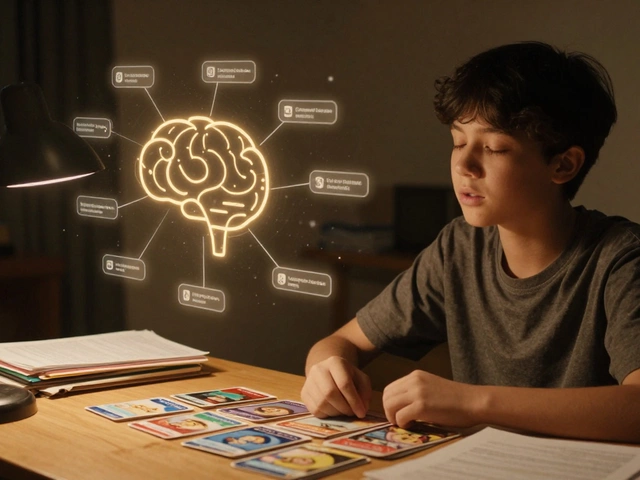Picture this: you’ve crammed a week’s worth of notes into your brain, your highlighters are bone dry, you’ve stared at flashcards until their colors blur… But on exam day, your mind is foggy and your stomach’s churning. You’re sure you know this stuff, so what’s up? The answer might be lurking somewhere between your kitchen and your local coffee shop. What you eat or drink before an exam can make or break your performance.
Hidden Enemies: Foods That Sabotage Your Exam Performance
It might sound odd, but the wrong breakfast could actually fry your focus faster than pulling an all-nighter. Top of the hit list? Super greasy foods—think bacon, sausages, and cheese-heavy breakfast sandwiches. These choices take forever to digest. Instead of fueling your brain, your body’s busy breaking down fat, leaving you feeling slow or even sleepy. High-fat meals have been linked in studies from the University of Cambridge to sluggish cognitive function on mental tasks—so save that fry-up for after the celebration.
Milk chocolate bars and sugary pastries might give you a quick hit, but they make your blood sugar spike and then crash. People commonly feel jittery and then foggy—a rollercoaster ride your brain just doesn’t need. The same goes for those “energy” drinks stacked next to the snacks at supermarket checkouts. Science backs this up: a study published in the journal Appetite (2017) found that students who consumed high-sugar breakfasts performed worse on memory tasks just two hours later than those who ate balanced protein and carbs.
Don’t be fooled by overly processed foods, either. White bread toast, glazed doughnuts, and packaged muffins strip out the fiber and pack in way too much salt or sugar. This combination not only zaps your energy but can also cause bloating or that weird jittery feeling. Fiber is key for steady blood sugar, and processed carbohydrates just can’t deliver that slow, sustained release.
Let’s not forget about big servings of red meat—like a leftover burger or steak—right before an exam. These meals can take ages to digest and may drag your energy and focus down, especially if you’re prone to feeling a little nervous.
Another sneaky culprit? Spicy foods. Hot sauce lovers, listen up: while spice wakes up your senses, anything too spicy right before that early test could upset your stomach. Your adrenaline’s already flowing, and extra stomach issues are no help. Save the Sriracha showdown for another time.
You might wonder about healthy foods. Raw veggies are good, right? Sure, but pounding a pile of raw broccoli or cauliflower or scooping up heaps of hummus with carrots in the hour before your exam could trigger bloating or gas. Not fun when you’re stuck in a silent room, shifting in your seat.
When in doubt, stick to balanced, familiar choices the morning of your exam, and avoid going overboard with anything new or heavy. Even “healthy” trends like protein shakes or nut bars can cause trouble if your stomach isn’t used to them or if they’re full of sneaky sugars and additives. Your best bet is testing your exam-day meal routine ahead of time, maybe on a practice test or study session. Your gut will thank you, and your brain will too.
The Dark Side of Drinks: What to Skip for a Clear Mind
Coffee is the faithful sidekick for late-night cramming, but drinking too much right before your exam is risky business. Sure, caffeine can perk you up and sharpen your focus—for a little while. Hit it too hard, though, and you risk the jitters, a racing heart, sweaty palms, and worst of all, a full bladder right as you’re about to sit quietly for two hours. Some research even shows that while moderate caffeine can help with attention, high doses (over 200mg, about two strong cups) actually hurt memory and accuracy under stress.
If you don’t normally drink coffee, don’t make your first ever mug of espresso part of your exam routine. Your stomach might rebel, and unpredictable reactions can throw you off your game. The same goes for those “energy” shots and fancy canned coffees loaded with sugar. They’re wildcards—one minute you’re feeling sharp, the next your brain’s scattered all over the page.
Sugary soft drinks belong on the no-go list, too. The big blast of sugar and caffeine sounds like a wake-up call, but you’ll hit a slump fast. That mental crash usually comes sooner than you expect—right about the time your exam shifts from short answer to long essays. People often try to fight that crash with more soda, but you’ll just feel more jittery, distracted, and oddly thirsty. Hydration’s important, but soft drinks hydrate about as well as pouring cola on a wilting plant. Stick with good old water if you want to stay sharp.
Fruit juice isn’t always a safe bet, either. Store-bought juices especially come loaded with “natural” sugar. Orange juice from concentrate can contain as much sugar per serving as soda, without any fiber to slow it down. If you’re set on juice, dilute it with water and stick to a small serving so you don’t get that sugar spike and inevitable crash.
Surprise, herbal teas can mess with you, too—especially “detox” blends or those marketed as sleep aids, loaded with ingredients that relax you a little too much. Chamomile, valerian root, or sleepy-time additives can make you feel drowsy when you want to be switched on. Go for a plain black or green tea if you need mild caffeine, but skip anything with weird herbs if you’re not used to it.
One last warning: don’t try to hydrate at the last minute by chugging huge amounts of water right before your exam. You definitely need to drink enough to stay alert, but overdoing it will just have you running for the restroom at the worst possible time. Drink small amounts steadily all morning instead of a giant bottle just before you leave the house.

Real-Life Tips and Alternatives for Exam-Day Eating and Drinking
It’s easy to get lost in lists of things not to eat, but what about positive choices? The trick is fueling your brain with foods that release their energy slowly and keep you feeling steady under pressure. Think complex carbs paired with protein and just a little healthy fat. Oatmeal with berries and a handful of nuts works wonders—not too heavy, but super satisfying. Greek yogurt with granola and chopped fruit is another solid choice.
Eggs, whether hard-boiled or scrambled, offer protein and are easy on the stomach. Whole-grain toast with peanut butter gives you the right balance of long-lasting energy. If you’re in a rush, a banana with a few almonds works as a quick, portable snack.
For drinks, nothing beats water for keeping you alert and hydrated. If you need caffeine, aim for one regular cup of coffee or tea—skip the monster double-espresso. If you’re tempted by juice, mix a splash of 100% fruit juice with water or seltzer for less sugar. Coconut water is also gentle and good for mild hydration, just check for added sugars.
Practice your exam-day routine at least a week before the real deal. Eat that same breakfast on a morning when you’re studying or doing practice problems. Notice how you feel an hour or two later—full, focused, bloated, restless? Adjust as needed. You’d be surprised by how much difference 30 minutes and a few little tweaks in your morning can make.
Go easy on spices and try not to switch up your diet right before test day. Your body likes routine, especially when the pressure’s on. If you know you get nervous, lighter is almost always better. And don’t forget to eat something! Skipping breakfast might sound tempting if you’re wired with nerves, but hunger will chase away your focus fast.
Some students swear by brain-boosters like blueberries, avocados, or even dark chocolate (in small doses, not candy-bar amounts). There’s some science behind those claims—antioxidants and healthy fats can support brain health—but nothing beats the basics of steady, whole-food nutrition.
If you’re stuck for ideas, here’s a go-to list you can tweak to fit your tastes:
- Oatmeal topped with walnuts and sliced banana
- Whole-grain toast with scrambled eggs and spinach
- Greek yogurt, honey, and mixed berries
- Peanut butter on apple slices with a handful of pumpkin seeds
- Unsweetened herbal or black tea and water
Sudden food changes, mystery supplements, or wild new routines right before an exam? Not worth it. Your brain works best when everything else is familiar and calm.
Exam-Day Myths: Busted and Explained
Everyone’s heard some out-there theory about what to eat or chug on big exam days. Some folks swear spicy food “wakes up” your mind, or that a massive breakfast gives a mental boost. On the flip side, a handful still think going into a test hungry keeps you “sharp.” Let’s just say reality is a whole lot less dramatic than rumor.
Myth one: “Sugar boosts brainpower before a test.” Sure, glucose (sugar) is your brain’s fuel, but it’s all about the delivery. Downing a soda or a sugary cereal gives such a quick spike that the crash hits right in the middle of your essay section. Complex carbs from oatmeal, sweet potatoes, or whole grains break down slower, delivering a steady stream of energy. Sugar highs lead to focus lows.
Myth two: “Big coffee gets you through any test.” Caffeine helps you feel more alert, but more isn’t better. Too much will make you anxious and scattered, and if you don’t normally drink it, the side-effects hit even harder. A normal-sized coffee’s enough for most people, and only if your system already knows the drill.
Myth three: “Energy drinks are made for this.” Energy drinks get you hyped, but the mix of sugar and caffeine usually leaves you worse off. Sleep researchers at Harvard actually found that students relying on energy drinks rarely improved test performance—and reported bigger mood swings when they wore off. Skip the hype for something you know actually fuels you.
Myth four: “Big breakfast equals better results.” There’s truth to eating before a test, but size matters. Huge, heavy foods weigh down your digestion and can steal energy from your brain. It’s all about balance—enough to feel full, but not stuffed. That’s why a meal that’s familiar, not experimental, works every time.
Myth five: “Nothing at all keeps you sharp.” Going in hungry makes it impossible to focus. Hungry students struggle more with memory, mood, and attention—because your brain is literally running on empty. If you get nausea from nerves, try nibbling toast or a banana; some fuel is always better than none.
It’s tempting to look for tricks, but performing well on exams always comes back to the details: eat balanced, hydrate right, stick to what you know, and don’t fall for food fads or crash diets on the big day. Trust your routine, trust your prep, and your stomach—and brain—will be on your side.
And remember the most important exam-preparation tip: fuel up wisely, and you’ll walk into that room ready to give your best shot. The rest is just showing what you already know.






